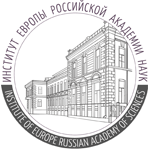institute of europe
the institute of europe of the russian academy of sciences
Challenges of catch-up: Emerging countries in the global economy
- 06 December 2024
On December 6, 2024, Alexander Vasilchenko, a junior researcher of the Department of Economic Studies of the Institute of Europe, RAS, participated in XII Annual Conference on Global Economy «Challenges of catch-up: Emerging countries in the global economy», in the young researchers’ section.
The conference was held at Faculty of World Economy and International Affairs of HSE University on December 4-6, the working language was English. The junior section was held in two parts: «Trade and industrial organization in regional and global context» and «Sectoral and country-specific approaches to sustainable development».
Among the participants of young researchers’ section there were junior researchers and PhD students representing Institute of Europe RAS, HSE University, Ural Federal University, Russian-Armenian (Slavic) University and other universities. Topics included the impact of US-China tech rivalry on global value chains, effects of global fragmentation on competitiveness of economic blocks, growing social and economic inequality in the world.
In his presentation «Evolution of European Automobile Manufacturing: Uneven Industrial Upgrading in Europe» Alexander Vasilchenko delineated the main factors behind the evolution of European automobile industry on the turn of XXI century, and discussed the specifics of transition to EV production in Europe. For more than 20 years CEE automobile industry remains uncompetitive globally and dependent heavily on leading Western MNEs. Wage gap between the ‘core’ and the ‘periphery’ in the sector remains high. In addition, creation of new jobs in CEE automobile industry is largely induced by cost minimization of the main MNEs. The reasons for ‘core-periphery’ model in European automobile manufacturing to be persistent include MNEs’ reluctance to foster competitors from the Eastern Europe, weak bargaining power of CEE automobile producers, as well as sustained path-dependence in the ‘peripheral’ manufacturing evolution. It was stressed that Europe risks to lose the ‘technological race’ to China that is now actively expanding its presence in CEE automobile industry. Largest Chinese car manufacturers invest substantially in Poland and Hungary to establish a set of production and assembly activities for EVs, whilst ‘traditional’ European MNEs (such as Volkswagen AG) resort to dismissals in ‘peripheral’ countries being faced with increasing competitive pressure in the global market.



